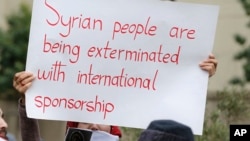New fighting erupted Sunday near Damascus in spite of the United Nations' demand for a 30-day cease-fire to allow rescue and medical workers to enter the region.
The British-based Syrian Observatory for Human Rights said one child was killed and more than 12 people suffered breathing difficulties after a suspected chlorine attack in the rebel-held eastern Ghouta district near Damascus on Sunday.
Russia's defense ministry said "leaders of armed groups are preparing a provocation to use toxic substances to accuse the regime of using chemical weapons", in a statement that also said the situation in Eastern Ghouta "continued to worsen".
In addition, nine people were killed and another 31 injured outside the Syrian capital, boosting the death toll to more than 500 in clashes over the last week.
Observatory chief Rami Abdel Rahman said there appeared be fewer air strikes but that fighting had intensified on the ground.
State media said government forces pushed into the capital's eastern Ghouta area, but opposition forces denied Damascus's troops had advanced. The Ghouta Media Center, an activist collective, said members of the Army of Islam insurgents had blocked the Syrian army, killing many soldiers.
Iranian General Mohammad Baqeri said Tehran, whose government backs Syrian President Bashar al-Assad, and Damascus would honor the U.N. resolution. But Baqeri also said the truce did not cover the area of the Damascus suburbs "held by the terrorists."
Ghouta-based activist Ahmad Khanshour said, "The Assad regime and his allies have shown no respect to the Security Council by launching their most intense offensive on Ghouta from several directions hours after the resolution was adopted."
State news media said the insurgents breached the truce by firing 15 shells at government-held areas.
U.N. chief Antonio Guterres, who has described eastern Ghouta under the bombardment as "hell on Earth," said the ceasefire must be "immediately" implemented.
Eastern Ghouta, is home to some 400,000 people, which the government has blockaded since 2013 — resulting in severe shortages of food and medical supplies.
The suburb, about 17 kilometers east of Damascus, is under the control of two Islamist factions and Syria's former al-Qaida affiliate.






